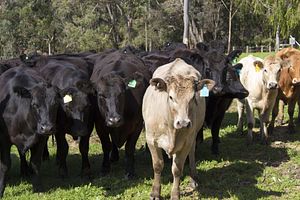Australia’s deep ties to the fate of China’s economy and the latter’s hunger for Australian resources is well known. So the problems and gyrations in China in recent days and weeks have been watched closely here.
The plunge in the Chinese stock market earlier this week had obvious, and immediate, repercussions for Australia. The All Ordinaries fell four percent Monday, and then spent the next two days bouncing back, 2.6 percent Tuesday and another 0.6 percent Wednesday. The plunge and recovery overall were quick, with the drop the steepest in two years. The Australian dollar has meanwhile weakened further, currently trading at 71 cents to the U.S. dollar, down from the level of around 75 cents where it has been for much of the year, and a sharp decline from the parity it enjoyed a few years ago (a strength than was tough on the country’s export sector).
What does all this mean in and for Australia? Fairfax China’s correspondent, writing in the Sydney Morning Herald on Tuesday, said, “In broad strokes, anything bad for the Chinese economy is not usually good news for Australia either.”
So how serious are the repercussions of the stock market fluctuations and currency devaluation. Certainly, these market movements can shake confidence, but that can recover, as we’ve seen. Speaking from Hong Kong on Wednesday, Trade Minister Andrew Robb made the somewhat counterintuitive argument that a devalued Chinese currency may mean more Chinese investors heading for Australian property: “What I think will happen out of this correction is that even more money will be looking for a safe haven in Australia.”
Australian economics blog MacroBusiness treated this comment with a grain, or many, of salt, “The dollar isn’t falling because capital is piling in.” and suggested the only growth area might be tourism.
Robb dismissed worries, pointing out that the important thing was to improve trade, citing growing Australian meat exports to China. Talking about the Australia dollar, he said, “We’re now down 30 percent on where we were 18 months ago and I can tell you it’s a huge driver of activity across the rest of the economy. Another two or three points won’t do our exporters any harm whatsoever.”
And this seems to be the point Australian politicians want to drive home: It’s the economy. The stock market crashes and currency devaluations apparently do not matter as long as the Chinese economy is still trucking along well enough to want to buy from Australia. Greg Jericho at the Guardian explains some problems with this position, namely noting that recent events are signs that China’s economy might not be as healthy as either leaders in Beijing or world markets might hope.
Given that the free trade agreement with China, the ChAFTA is due to go before Australian parliament later this year, there is a big focus on making sure everyone knows the potential for an improved Australian economy thanks to Chinese demand, which apparently is not slowing, according to the trade minister, pointing to the increase in Australian meat exports to China over the last three years.
The Chinese, for their part, are also watching the ChAFTA thanks to Labor and union protests over the possibility of the importation of Chinese labor for some projects, which may undercut local job seekers (discussed further in the upcoming September issue of The Diplomat’s magazine). According to The Australian, Robb was asked in four interviews about this and was at pains to at once reassure any possible Chinese investors while attacking unions like the CFMEU at the same time.
So for now at least the official message in Australia is this: Forget the stock market or the currency, because it’s the economy that matters.

































